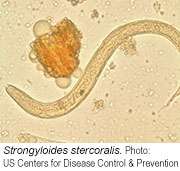Man dies after parasitic worms invade lungs

(HealthDay)—A Vietnamese immigrant in California died of a massive infection with parasitic worms that spread throughout his body, including his lungs. They had remained dormant until his immune system was suppressed by steroid drugs used to treat an inflammatory disorder, according to the report.
The 65-year-old man was apparently infected by the worms in Vietnam, one of many countries in the world where they're known to infect humans. About 80 percent to 90 percent of people die if they are infected by the worm species and then suffer from so-called "hyperinfection" as the worms travel through their bodies, said report co-author Dr. Niaz Banaei, an assistant professor of infectious diseases at Stanford University School of Medicine.
The man's case emphasizes the importance of testing patients who might be infected with the parasite before giving them drugs to dampen the immune system, said Dr. Peter Hotez, dean of the National School of Tropical Medicine at Baylor College of Medicine, who's familiar with the report findings.
"You have to think twice before starting big doses of steroids," Hotez said. "The problem is that most physicians are not taught about this disease. It often does not get recognized until it's too late."
Parasitic worms of the Strongyloides stercoralis species are most commonly found in tropical and subtropical areas of the world, although they've also appeared in the Appalachian region of the United States. Typically, they infect people in rural areas such as Brazil, northern Argentina and Southeast Asia, Hotez noted, and may currently infect as many 100 million people worldwide.
The worms live in the ground or water, typically in places with poor sanitation, and infect humans by penetrating the skin. They may live in the intestines for years or even decades, creating new larvae that grow into worms about 2 millimeters long, Hotez explained.
For the patient in this case, trouble came when he took steroids, which dampen the immune system, to treat "giant-cell arteritis," a disorder that causes inflammation of arteries of the scalp, neck and arms. The drugs appeared to have allowed the worms to grow and spread because they were no longer kept in check.
Exams uncovered a massive lung infection, report co-author Banaei noted. "The adult worms were producing eggs, and the larvae emerging from the eggs were invading the intestinal wall and disseminating to multiple organs in the body," Banaei said.
When this happens, Baylor's Hotez said, hundreds of thousands of larvae can transmit bacteria from the intestines into other parts of the body.
A medication can help treat infestation with the worms, but it doesn't help when the hyperinfection reaches an advanced stage, he said.
What should be done? In cases where patients come from a region of the world where the worms are common, Hotez suggested that physicians consider that they may be infected and screen them for the worms. That may be difficult though, because multiple fecal tests may be necessary, he said, and another kind of test has limited value in terms of detecting cases.
The study findings are published in the March 21 issue of the New England Journal of Medicine.
More information: For more about the worm species Strongyloides stercoralis, visit the University of Michigan.
Health News Copyright © 2013 HealthDay. All rights reserved.
















